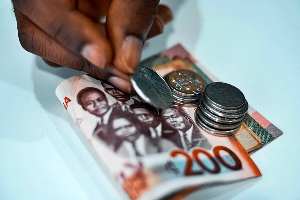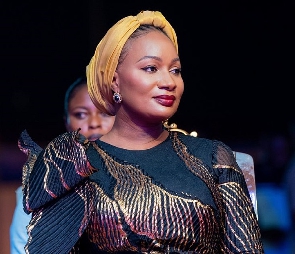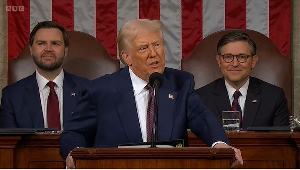Fitch Ratings has affirmed Ghana's Long-Term Foreign-Currency (LTFC) Issuer Default Rating (IDR) at 'RD' and Long-Term Local-Currency (LTLC) Issuer Default Rating (IDR) at 'CCC'.
Fitch typically does not assign outlooks to sovereigns with a rating of 'CCC+' or below.
Key Rating Drivers
Eurobond Default Continues: The affirmation of the LTFC IDR at 'RD' reflects that Ghana is still defaulting on its outstanding Eurobonds following the expiration of the grace period for a missed coupon payment in February 2023.
Ghana has since made progress in its Common Framework restructuring process. An agreement on the main terms of the official bilateral debt treatment with the official creditor committee was reached in January 2024 and the memorandum of understanding that formalises these terms as well as non-financial terms, was finalised in June 2024.
Imminent Eurobond Exchange: In June 2024, Ghana and representatives of bondholders who own or control approximately 40% of the outstanding USD13 billion Eurobonds, reached an agreement in principle (AIP) on the terms of the Eurobonds restructuring.
This AIP meets both the IMF's debt sustainability thresholds and the Common Framework's comparability of treatment clause. An AIP was previously reached in January 2024 but subsequently rejected by the IMF as it did not comply with its debt sustainability thresholds.
We expect the consent solicitation to be launched imminently, and the Eurobond exchange to be settled by September 2024, although there could still be some delays due to ongoing negotiations on the restructuring terms of the International Development Association (IDA)-partially guaranteed bond. Ghana's FC non-bond commercial debt would still need to be restructured on comparable terms. We expect completion of the external debt restructuring by end-2024.
Significant Reduction in Terms: In exchange for the 15 outstanding Eurobonds, investors will be offered a set of new bonds, with two options. Under the 'disco' option, a nominal haircut of 37% will be implemented on all claims, including past due interests (PDIs), and the remaining claims restructured into bonds maturing from 2026 to 2035 with coupon rates ranging from 0% to 6%.
Under the 'par' option, capped at USD1.6 billion, a nominal haircut of 37% will be implemented only on PDIs and the remaining claims restructured into bonds maturing from 2026 to 2037 with coupon rates ranging from 0% to 1.5%. Unlike another recent Common Framework restructuring, the new bonds do not offer value-recovery instruments.
Substantial Debt Relief: If implemented, and assuming the USD1.6 billion cap on the 'par' option is reached, the AIP would entail a reduction in Ghana's FC debt stock of around 6% of estimated 2024 GDP.
Interest payments would be reduced by 1.1% of GDP in 2024, 0.8% in 2025 and 0.6% in 2026 compared with initially due interest payments, or 7%, 5% and 4% of 2024, 2025 and 2026 revenue and grants, respectively.
These estimates do not factor in the cost of rolling over bonds that would have matured in 2023-2026, implying larger actual debt relief. Assuming similar treatment of non-bond FC commercial debt, the debt stock reduction would reach 8% of estimated 2024 GDP.
LC IDRs Affirmed: The affirmation of the LC IDRs reflects that Ghana has remained current on the 'new' bond payments issued on the settlement date of the domestic debt exchange programme and on LC securities issued since November 2023. We consider an additional restructuring of Ghana's LC-denominated debt as unlikely, given the sizeable debt service reduction this programme represented. However, the affirmation also reflects still substantial credit risk partly due to elevated interest payments.
Large Fiscal Consolidation: We estimate the 2024 primary surplus, on a commitment basis, will reach 0.3% of GDP, representing a 4.6pp adjustment compared with 2022, driven by a 0.6pp increase in revenue and a 4.1pp reduction in primary expenditure. Despite a record of fiscal slippage in election years, we consider there is a low risk of policy slippage in the lead up to the elections due in December 2024, given the strong commitment of authorities to the IMF programme, but there is currently greater uncertainty over the degree of commitment of a new administration. We project Ghana's primary surplus to reach 0.9% of GDP in 2026 on a commitment basis.
Moderate CADs: Suspension of external debt service, and merchandise import reduction that more than offset lower export performance, enabled Ghana to reach a current account surplus of 1.8% of GDP in 2023, from a 2.3% deficit in 2022. We anticipate the current account balance to return to a deficit of 0.7% of GDP in 2024, on difficulties in the cacao sector and external debt service resumption, followed by 1.5% and 1.7% in 2025 and 2026, respectively.
These moderate current account deficits (CAD), compounded with large disbursements from international financing institutions, would enable gross international reserves to gradually increase to 2.8 months of current external payments in 2026, from 1.6 months in 2023.
IDA-Partially Guaranteed Bond Affirmed: Fitch has affirmed the issue rating on Ghana's US dollar-denominated notes due October 2030 at 'CC'. The notes benefit from a partial credit guarantee backed by the IDA for scheduled debt service payments up to 40% of the outstanding principal amount, supporting higher recoveries. The affirmation of Ghana's bond partially guaranteed by IDA reflects our estimation of a nominal recovery rate in the range 51% to 70%, although the modalities of the treatment of this bond are still being discussed. IDA has already made three coupon payments in 2023 and 2024.
ESG - Governance: Ghana has an ESG Relevance Score (RS) of '5' for both Political Stability and Rights and for the Rule of Law, Institutional and Regulatory Quality and Control of Corruption.
These scores reflect the high weight that the World Bank Governance Indicators (WBGI) have in our proprietary Sovereign Rating Model. Ghana has a medium WBGI ranking at the 50.5th percentile reflecting a recent track record of peaceful political transitions, a moderate level of rights for participation in the political process, moderate institutional capacity, established rule of law and a moderate level of corruption.
ESG - Creditor Rights: Ghana has an ESG Relevance Score (RS) of '5' for Creditor Rights as willingness to service and repay debt is highly relevant to the rating and is a key rating driver with a high weight. The rating on Ghana's LTFC IDR reflects Fitch's view that Ghana is in default.
Rating sensitivities
Factors that could individually or collectively lead to negative rating action/downgrade
-The LTLC IDR would be downgraded on renewed liquidity pressures, for example, as a result of significant delays in the external debt restructuring process, that increase the probability of further restructuring or a non-payment on LC debt.
Factors that could individually or collectively lead to positive rating action/upgrade
- Once Ghana reaches an agreement with private creditors on the restructuring of its FC-denominated external debt and completes that restructuring process Fitch will assign a LTFC IDR based on a forward-looking assessment of its willingness and capacity to honour its foreign-currency debt.
- The LTLC IDR would be upgraded on reduced liquidity pressures, potentially following the completion of the external debt treatment, for example, due to a restoration of macroeconomic stability that would significantly lower debt interest costs.
Sovereign Rating Model (SRM) and Qualitative Overlay (QO)
Fitch's proprietary SRM assigns Ghana a score equivalent to a rating of 'B-' on the Long-Term Foreign-Currency IDR scale. However, in accordance with its rating criteria, Fitch's sovereign rating committee has not utilised the SRM and QO to explain the ratings in this instance. Ratings of 'CCC+' and below are instead guided by the rating definitions.
Fitch's SRM is the agency's proprietary multiple regression rating model that employs 18 variables based on three-year centred averages, including one year of forecasts, to produce a score equivalent to a LTFC IDR. Fitch's QO is a forward-looking qualitative framework designed to allow for adjustment to the SRM output to assign the final rating, reflecting factors within our criteria that are not fully quantifiable and/or not fully reflected in the SRM.
Country Ceiling
The Country Ceiling for Ghana is 'B-'. For sovereigns rated 'CCC+' and below, Fitch assumes a starting point of 'CCC+' for determining the Country Ceiling. Fitch's Country Ceiling Model produced a starting point uplift of +0 notch above the IDR. Fitch's rating committee applied a +1-notch qualitative adjustment to the model result under the Balance of Payments Restrictions pillar.
The Country Ceiling of 'B-' reflects our view that the private sector has not been prevented or significantly impeded from converting local currency into foreign currency and transferring the proceeds to non-resident creditors to service debt payments.
Fitch does not assign Country Ceilings below 'CCC+', and only assigns a Country Ceiling of 'CCC+' in the event that transfer and convertibility risk has materialised and is impacting the vast majority of economic sectors and asset classes.
References for substantially material source cited as key driver of rating
The principal sources of information used in the analysis are described in the Applicable Criteria.
ESG Considerations
Ghana has an ESG Relevance Score of '5' for Political Stability and Rights as World Bank Governance Indicators have the highest weight in Fitch's SRM and are therefore highly relevant to the rating and a key rating driver with a high weight.
As Ghana has a percentile rank below 50 for the respective Governance Indicator, this has a negative impact on the credit profile.
Ghana has an ESG Relevance Score of '5' for Rule of Law, Institutional & Regulatory Quality and Control of Corruption as World Bank Governance Indicators have the highest weight in Fitch's SRM and are therefore highly relevant to the rating and are a key rating driver with a high weight.
As Ghana has a percentile rank below 50 for the respective Governance Indicators, this has a negative impact on the credit profile.
Ghana has an ESG Relevance Score of '4[+]' for Human Rights and Political Freedoms as the Voice and Accountability pillar of the World Bank Governance Indicators is relevant to the rating and a rating driver.
As Ghana has a percentile rank above 50 for the respective Governance Indicator, this has a positive impact on the credit profile.
Ghana has an ESG Relevance Score of '5' for Creditor Rights as willingness to service and repay debt is relevant to the rating and is a rating driver for Ghana, as for all sovereigns. The default on the foreign-currency denominated debt reflected in the LTFC IDR at 'RD' has a negative impact on the credit profile.
The highest level of ESG credit relevance is a score of '3', unless otherwise disclosed in this section.
A score of '3' means ESG issues are credit-neutral or have only a minimal credit impact on the entity, either due to their nature or the way in which they are being managed by the entity.
Fitch's ESG Relevance Scores are not inputs in the rating process; they are an observation on the relevance and materiality of ESG factors in the rating decision.
Business News of Saturday, 3 August 2024
Source: fitchratings.com

















